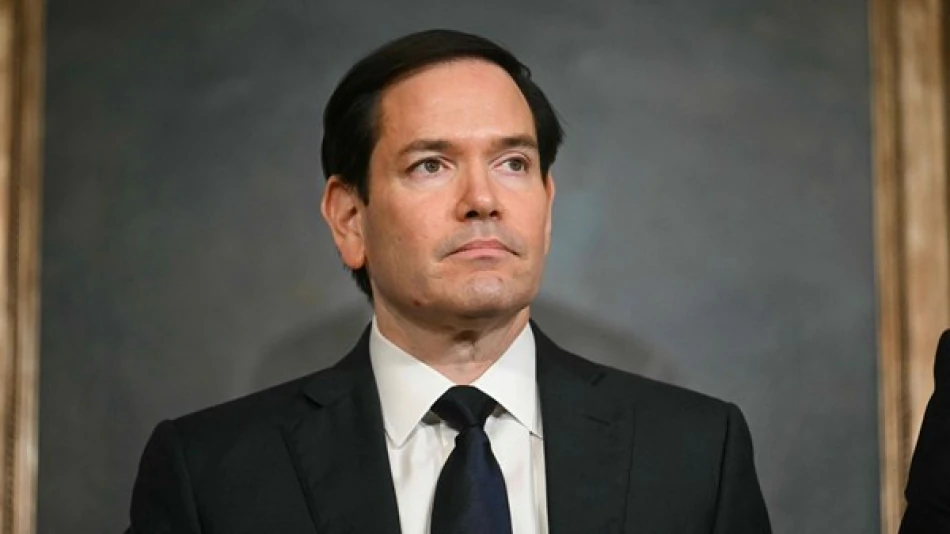
Trump Seeks to Halt Ukraine Conflict After Pivotal Putin Summit
Trump-Putin Summit Set for Friday as US Seeks Immediate Ukraine Ceasefire
US Secretary of State Marco Rubio announced Thursday that President Donald Trump will hold direct talks with Russian President Vladimir Putin on Friday, marking a pivotal diplomatic moment in the three-year Ukraine conflict. While the administration hopes for an immediate cessation of hostilities, Rubio cautioned that a comprehensive peace settlement will require extensive negotiations over security guarantees and territorial disputes.
Ceasefire First, Comprehensive Peace Later
Speaking to reporters at the State Department, Rubio outlined a two-phase approach to ending the conflict. The immediate goal is securing a ceasefire to halt the fighting, which would then create space for broader negotiations addressing the root causes of the war.
"To achieve peace, I think we all recognize the need for dialogue on security guarantees," Rubio explained. "There must be dialogue that addresses conflicts and territorial claims, and the causes of the conflict."
This strategy reflects lessons learned from previous conflicts where prolonged fighting hardened positions and complicated eventual peace settlements. The administration appears to recognize that battlefield dynamics shift daily, affecting each side's negotiating leverage and willingness to compromise.
The Challenge of Prolonged Warfare
Rubio emphasized the urgency of action, noting that extended conflicts become increasingly difficult to resolve. "The longer wars go on, the harder they become to end," he stated, highlighting how ongoing battlefield changes affect what each party views as leverage.
This observation carries particular weight given the current state of the Ukraine conflict. Recent months have seen fluctuating front lines and shifting military advantages, with both sides adjusting their strategic objectives based on territorial gains and losses.
Diplomatic Momentum Building
The Friday meeting represents the culmination of multiple preliminary conversations. Rubio revealed that Trump has spoken with Putin approximately four times by phone, suggesting sustained diplomatic engagement behind the scenes.
"He sees it as important now to have direct talks with him... to understand what is possible and what is not possible," Rubio said, indicating that the administration has moved beyond exploratory discussions to serious negotiation attempts.
Historical Context and Precedent
The Trump administration's approach mirrors successful conflict resolution strategies employed in other protracted wars. The emphasis on securing an immediate ceasefire before addressing underlying issues follows patterns seen in conflicts from Korea to the Balkans, where stopping the violence created conditions for meaningful negotiations.
However, the Ukraine conflict presents unique challenges. Unlike many previous wars, this involves major nuclear powers and fundamental questions about European security architecture that have persisted since the Cold War's end.
What Success Looks Like
Rubio's comments suggest the administration defines success in stages. An immediate ceasefire would represent a significant achievement, even without resolving territorial disputes or security guarantees that sparked the conflict.
The Secretary of State expressed cautious optimism while acknowledging limitations: "We are optimistic. We want peace to be achieved. We will do our utmost to achieve that, but ultimately it is up to Ukraine and Russia to agree on it."
This statement reflects the reality that while the US can facilitate negotiations, sustainable peace requires genuine commitment from the primary combatants. The administration appears to be positioning itself as an honest broker rather than attempting to impose a solution.
Market and Global Implications
The prospect of even a temporary ceasefire could have immediate effects on global markets, particularly energy prices and European economic stability. Investors have closely watched diplomatic developments, with commodity markets especially sensitive to potential changes in the conflict's trajectory.
A successful ceasefire could also influence broader geopolitical alignments, potentially affecting NATO unity and US relationships with both European allies and other global powers watching how America handles this critical test of its diplomatic capabilities.
Most Viewed News

 Layla Al Mansoori
Layla Al Mansoori






